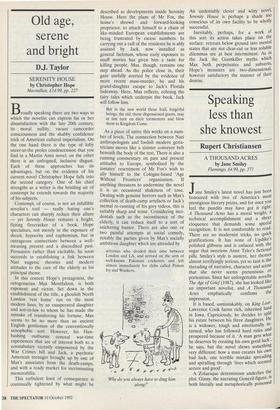Old age, serene and bright
D.J. Taylor
SERENITY HOUSE by Christopher Hope Macmillan, £14.99, pp. 227 Broadly speaking there are two ways in which the novelist can express his or her dissatisfaction with the late 20th century, its moral nullity, vacant camcorder consciousness and the shabby confidence trick of American cultural imperialism. On the one hand there is the type of lofty sneer-at-the proles condescension that you find in a Martin Amis novel; on the other there is an unfeigned, inclusive disgust. Each of these approaches has its advantages, but on the evidence of his current novel Christopher Hope falls into the second category. One of his chief strengths as a writer is the bristling air of contempt he extends towards the majority of his subjects.
Contempt, of course, is not an infallible novelist's tool — really hating one's characters can sharply reduce their allure — yet Serenity House remains a bright, fizzing firecracker of a book. Hope specialises, not merely in the exposure of deceit, hypocrisy and euphemism, but in outrageous connections between a well- meaning present and a discredited past. Persuasive rather than excitable, he soon succeeds in establishing a link between Nazi eugenic theories and modern attitudes to the care of the elderly as his principal theme.
In this context Hope's protagonist, the octogenarian Max Montfalcon, is both exponent and victim. Set down in the establishment of the title, a ghoulish North London 'rest home' run on the most modern lines, by an exasperated daughter and son-in-law to whom he has made the mistake of transferring his fortune, Max seems to be no more than an ancient English gentleman of the conventionally xenophobic sort. However, his Hun- bashing outbursts conceal war-time experiences that are of interest both to a constabulary recently empowered by the War Crimes bill and Jack, a psychotic American teenager brought up by one of Max's associates from the death-camps, and with a ready market for incriminating memorabilia.
This turbulent knot of consequence is continually tightened by what might be described as developments inside Serenity House. Here the plans of Mr Fox, the home's shrewd and forward-looking proprietor, to attach himself to a chain of like-minded European establishments are being frustrated by excess numbers. In carrying out a cull of the residents he is ably assisted by Jack, now installed as general factotum, whose early exposure to snuff movies has given him a taste for killing people. Max, though, remains one step ahead. As the police close in, their gaze usefully averted by the evidence of more recent mass-murder, he and his grand-daughter escape to Jack's Florida hideaway. Here, Max reflects, echoing the fairy tales which underpin the book, Jack will follow him.
But in the new world those frail, forgetful beings, the old, those dispossessed giants, may at last turn on their tormentors and blow them to Kingdom Come.
As a piece of satire this works on a num- ber of levels. The connection between Nazi anthropologists and foolish modern geria- tricians moves like a sinister conveyor belt beneath the body of the text. There is also a running commentary on past and present attitudes to Europe, symbolised by the inmates' resentment of Mr Fox's wish to ally himself to the Cologne-based 'Age Without Frontiers' organisation. If anything threatens to undermine the novel it is an occasional shakiness of tone. Dealing with genuine horrors such as Max's collection of death-camp artefacts or Jack's mental re-running of his gory videos, this is suitably sharp and tense. Considering inci- dentals such as the incontinence of the elderly, it can reduce itself to a sort of snickering banter. There are also one or two painful attempts at social comedy, notably the parties given by Max's socially ambitious daughter which are attended by
actresses who divided their time between London and LA, and arrived on the arm of well-known Pakistani cricketers and left almost immediately for clubs called Poison Ivy and Wankers.
'Why do you always have to drag him along?' An undeniably clever and witty novel, Serenity House is perhaps a shade too conscious of its own facility to be wholly successful.
Inevitably, perhaps, for a work of this sort its action takes place on the surface: retreats below ground into mental states that are not clear-cut or less soluble dilemmas are at best intermittent. As in the Jack the Giantkiller myths which Max both perpetuates and subverts, Hope's monsters are two-dimensional, however satisfactory the manner of their demise.


























































 Previous page
Previous page